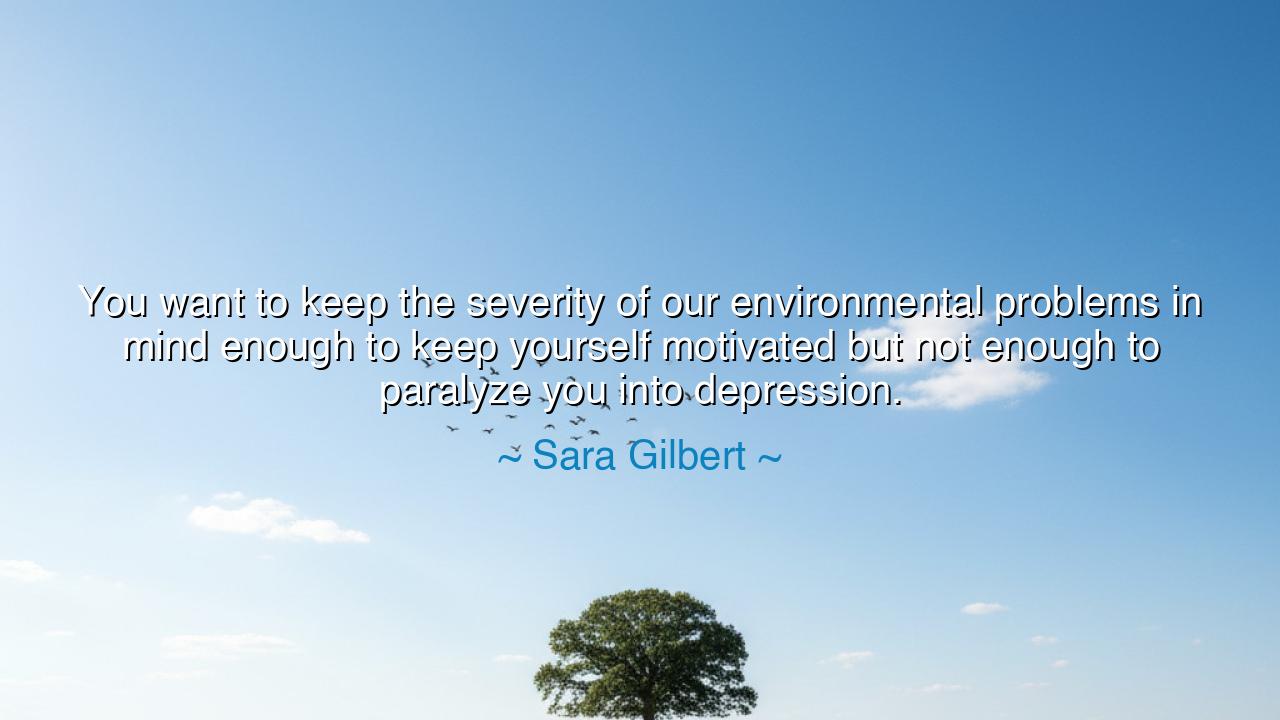
You want to keep the severity of our environmental problems in
You want to keep the severity of our environmental problems in mind enough to keep yourself motivated but not enough to paralyze you into depression.






Hear, O children of the earth, and incline your spirit to the words of Sara Gilbert, who speaks with the wisdom of balance: “You want to keep the severity of our environmental problems in mind enough to keep yourself motivated but not enough to paralyze you into depression.” This teaching is no small counsel, but a guide for the soul as it walks the perilous line between despair and hope. For the weight of the world’s wounds is heavy, yet to carry it wrongly is to sink beneath it; to carry it rightly is to rise with strength.
From the beginning, humankind has looked upon the face of the earth with awe and with fear. We till the soil, we drink the rivers, we breathe the wind, and yet in our hunger we wound the very mother who sustains us. To know this truth fully is to feel sorrow, for the severity of our environmental problems is undeniable: forests burned, seas rising, creatures vanishing into silence. But Gilbert warns us against drowning in this sorrow, for despair makes the heart heavy and the hand idle. To fall into paralysis is to abandon the fight before it has begun.
Consider the tale of Rachel Carson, who in the 1960s lifted her voice in the book Silent Spring. She saw the creeping poison of pesticides, the death of birds, the ruin of land. Her heart grieved, but she did not yield to despair. Instead, she transformed grief into courage and spoke so powerfully that an entire nation awoke. Laws were changed, awareness spread, and a movement for environmental protection was born. Carson carried the burden, yes, but she carried it as a torch, not a tombstone.
How many times in history have men and women been tempted by hopelessness, only to rise instead in heroic resolve? When plagues swept through medieval Europe, some were lost in terror, believing the end had come. Yet others, like the devoted caregivers who risked their lives to tend to the sick, turned dread into action. Likewise, in our own age, the enormity of climate change may tempt us to surrender, whispering, “It is too late.” But Gilbert calls us to a wiser path: to hold the sorrow close enough to stir us, yet not so close that it devours our will.
The lesson is clear: awareness without action is despair, and action without awareness is folly. We must neither close our eyes to the crisis nor let the darkness blind us to the possibility of renewal. The earth needs not the paralysis of mourners, but the courage of healers. Each act—whether planting a tree, conserving water, reducing waste, or speaking truth—becomes a stone laid in the path toward restoration.
In your daily life, then, cultivate balance. Read and learn of the challenges that face the world, but do not dwell so long on shadows that you forget the light. Join with others in small but meaningful labors. Walk to the market, share what you have, protect what is near, teach the young to revere the soil and the sky. Let your heart be pierced by grief, but let that grief sharpen your resolve rather than break your spirit.
For in truth, the earth has always healed when her children have risen in care and courage. As the forest returns to lands once ravaged, as rivers grow clear where once they ran black with poison, so too can our future be reborn if we walk the narrow road between despair and hope. Gilbert’s words are not merely counsel for the mind, but a call to action for the heart: bear the burden, but walk forward still.
And so I say to you: let your sorrow for the earth be the flame that lights your work, not the weight that crushes it. Remember always that even the smallest act, born of love, is stronger than the greatest despair. In this way, you will honor the earth, you will honor yourselves, and you will leave behind not paralysis, but a legacy of healing for generations yet unborn.






AAdministratorAdministrator
Welcome, honored guests. Please leave a comment, we will respond soon